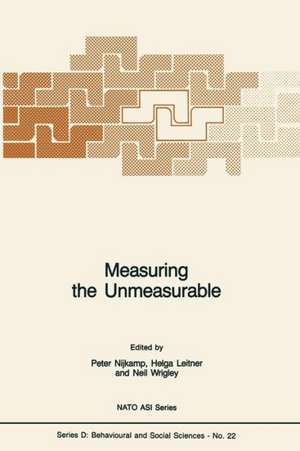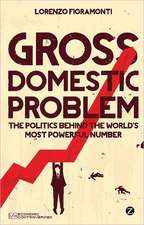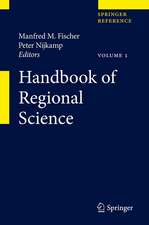Measuring the Unmeasurable: NATO Science Series D:, cartea 22
Helga Leitner Editat de Peter Nijkamp N. Wrigleyen Limba Engleză Paperback – 5 oct 2011
Din seria NATO Science Series D:
- 18%
 Preț: 1223.25 lei
Preț: 1223.25 lei -
 Preț: 399.88 lei
Preț: 399.88 lei -
 Preț: 398.74 lei
Preț: 398.74 lei - 18%
 Preț: 953.35 lei
Preț: 953.35 lei -
 Preț: 389.88 lei
Preț: 389.88 lei - 18%
 Preț: 1230.53 lei
Preț: 1230.53 lei -
 Preț: 399.29 lei
Preț: 399.29 lei - 18%
 Preț: 953.35 lei
Preț: 953.35 lei - 18%
 Preț: 1226.90 lei
Preț: 1226.90 lei - 5%
 Preț: 390.13 lei
Preț: 390.13 lei - 5%
 Preț: 370.94 lei
Preț: 370.94 lei -
 Preț: 412.95 lei
Preț: 412.95 lei - 18%
 Preț: 1224.18 lei
Preț: 1224.18 lei - 15%
 Preț: 480.20 lei
Preț: 480.20 lei - 18%
 Preț: 1226.73 lei
Preț: 1226.73 lei - 5%
 Preț: 2124.15 lei
Preț: 2124.15 lei - 15%
 Preț: 638.11 lei
Preț: 638.11 lei - 18%
 Preț: 1833.16 lei
Preț: 1833.16 lei -
 Preț: 401.24 lei
Preț: 401.24 lei -
 Preț: 390.84 lei
Preț: 390.84 lei - 18%
 Preț: 1237.80 lei
Preț: 1237.80 lei - 18%
 Preț: 1826.69 lei
Preț: 1826.69 lei - 18%
 Preț: 1830.34 lei
Preț: 1830.34 lei -
 Preț: 388.13 lei
Preț: 388.13 lei - 18%
 Preț: 948.47 lei
Preț: 948.47 lei - 18%
 Preț: 1835.53 lei
Preț: 1835.53 lei - 18%
 Preț: 1227.67 lei
Preț: 1227.67 lei - 18%
 Preț: 1225.79 lei
Preț: 1225.79 lei -
 Preț: 398.53 lei
Preț: 398.53 lei - 18%
 Preț: 1831.73 lei
Preț: 1831.73 lei -
 Preț: 396.24 lei
Preț: 396.24 lei - 18%
 Preț: 1661.13 lei
Preț: 1661.13 lei
Preț: 412.95 lei
Nou
Puncte Express: 619
Preț estimativ în valută:
79.02€ • 82.72$ • 65.38£
79.02€ • 82.72$ • 65.38£
Carte tipărită la comandă
Livrare economică 07-21 aprilie
Preluare comenzi: 021 569.72.76
Specificații
ISBN-13: 9789401087476
ISBN-10: 9401087474
Pagini: 728
Ilustrații: IX, 713 p.
Dimensiuni: 155 x 235 x 38 mm
Greutate: 1 kg
Ediția:Softcover reprint of the original 1st ed. 1985
Editura: SPRINGER NETHERLANDS
Colecția Springer
Seria NATO Science Series D:
Locul publicării:Dordrecht, Netherlands
ISBN-10: 9401087474
Pagini: 728
Ilustrații: IX, 713 p.
Dimensiuni: 155 x 235 x 38 mm
Greutate: 1 kg
Ediția:Softcover reprint of the original 1st ed. 1985
Editura: SPRINGER NETHERLANDS
Colecția Springer
Seria NATO Science Series D:
Locul publicării:Dordrecht, Netherlands
Public țintă
ResearchCuprins
Qualitative Spatial Data Analysis: A Compendium of Approaches.- A. Generalized Linear Models and Categorical Data.- Statistical Models for Qualitative Data.- Statistical and Scientific Aspects of Models for Qualitative Data.- Analysis of Qualitative Individual Data and of Latent Class Models with Generalized Linear Models.- Categorical Regression Models for Contextual Analysis; A Comparison of Logit and Linear Probability Models.- Multivariate Contingency Table Analysis with NONMET: Basic Ideas.- Categorical Data Methods and Discrete Choice Modelling in Spatial Analysis: Some Directions for the 1980s.- B. Log-Linear Models.- Hybrid Log-Linear Models.- A Comparison of the Loglinear Interaction Model with Other Spatial Interaction Models.- Modelling Cross-Tabulated Regional Data.- C. Partial Least Squares and Lisrel models.- Systems Analysis by Partial Least Squares.- Recent Developments on Categorical Data Analysis by PLS.- Soft Modelling and Spatial Econometrics: Towards an Integrated Approach.- Structural Equation Models with Qualitative Observed Variables.- D. Multidimensional Qualitative Analysis.- Multidimensional Data Analysis for Categorical Variables.- Analyzing Activity Pattern Data Using Qualitative Multivariate Statistical Methods.- Unemployment and the Rise of National Socialism: Contradicting Results from Different Regional Aggregations.- Generalized Path Analysis for Mixed Geographical Data.- Order-Dependent Measures of Correspondence for Comparing Proximity Matrices and Related Structures.- A Survey of Qualitative Multiple Criteria Choice Models.- E. Fuzzy and Qualitative Structures.- A Linguistically-Based Regional Classification System.- Fuzzy Data Analysis in a Spatial Context.- Qualitative Structure Analysis of Complex Systems.- F. Discrete Choice Models and Dynamics Analysis.- Trends and Prospects for Qualitative Disaggregate Spatial Choice Models.- The Analysis of Panel Data for Discrete Choices.- Travel-Activity Behavior in Time and Space: Methods for Representation and Analysis.- Dynamic Analysis of Qualitative Variables: Applications to Organizational Demography.- Mathematical Specification of Transportation Models.- General Representational Formalisms and Search Procedures for Inferring Models from Categorical Data.- G. Synthesis.- Developing Trends in Qualitative Spatial Data Analysis.
Notă biografică
Professor Dr P. Nijkamp has received the 1996 Spinoza Award, an annual award to honour outstanding scientific merit and to stimulate innovative future research.














